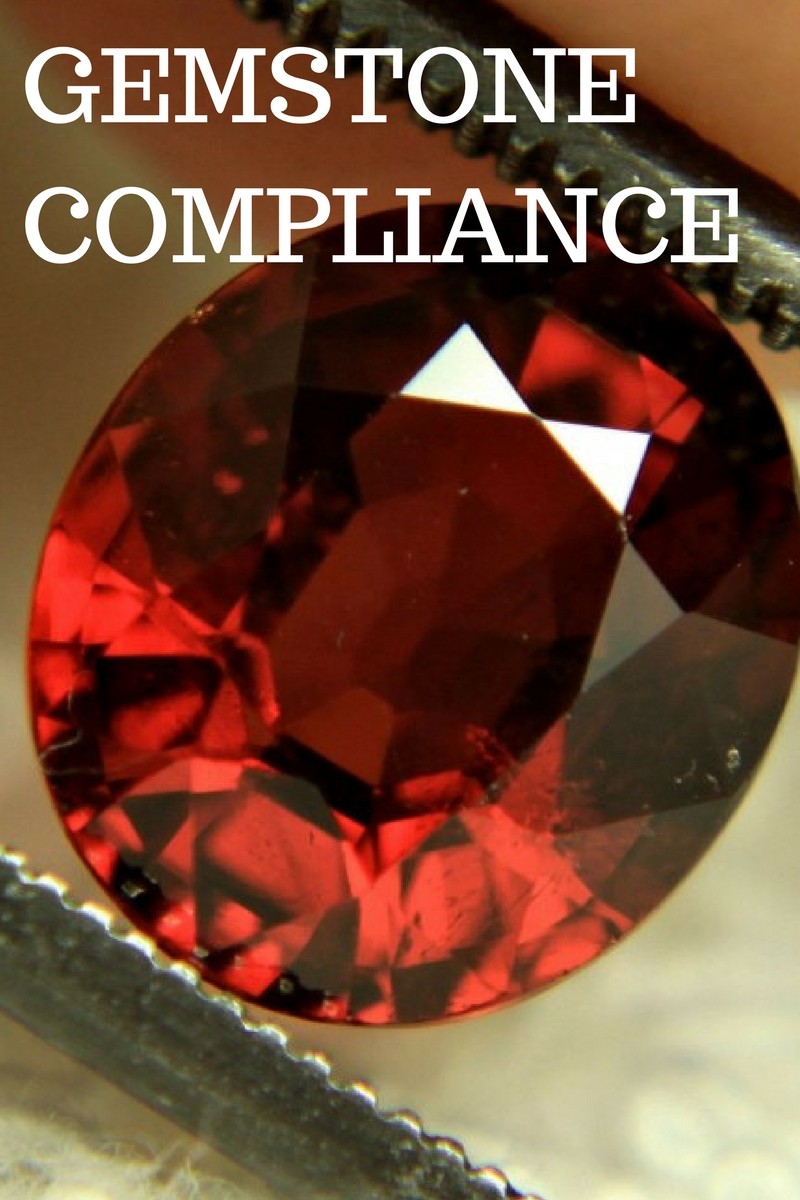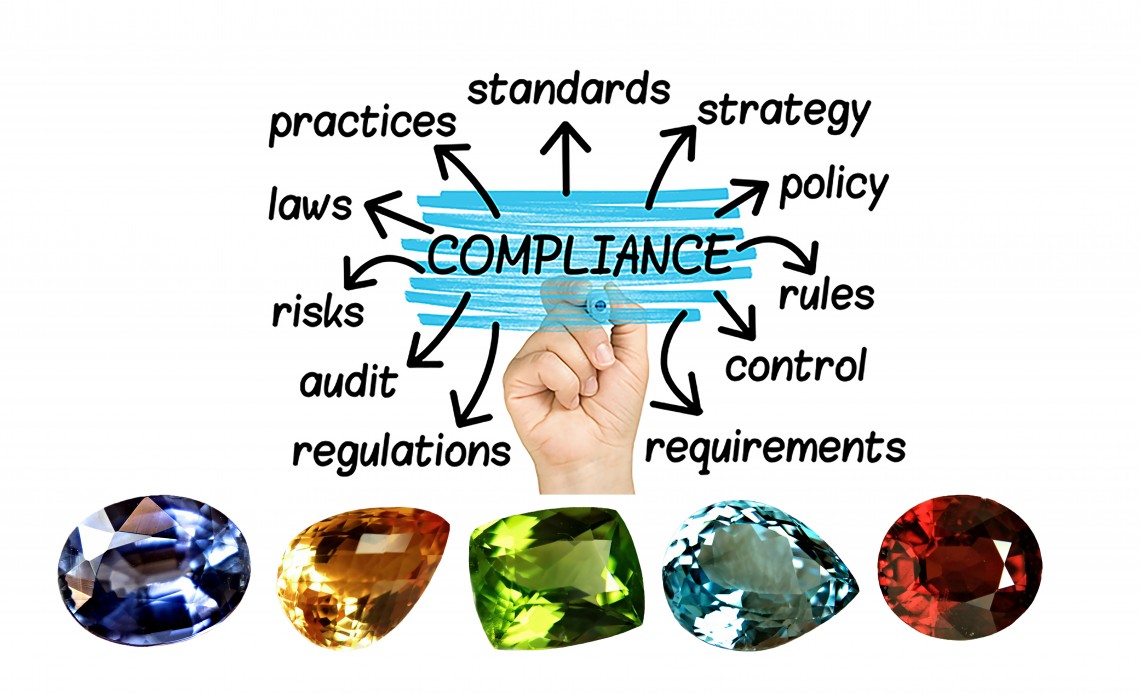
Gemstone Compliance
 The gemstone industry
has had a history of free trade and non-compliance with many
entrepreneurs making good income from mining to cutting to
wholesaling gemstones. It’s been the wild
west show for many years, but those days are coming to an end. Gemstone sellers will be facing various issues regarding compliance to prove the legitimacy of their business.
The gemstone industry
has had a history of free trade and non-compliance with many
entrepreneurs making good income from mining to cutting to
wholesaling gemstones. It’s been the wild
west show for many years, but those days are coming to an end. Gemstone sellers will be facing various issues regarding compliance to prove the legitimacy of their business.
Historical attitudes of gemstone compliance
When we started Gem Rock Auctions in 2005 after establishing Opal Auctions in 2004, I was staggered to see a completely different attitude to the gemstone industry compared to the opal industry. This beautiful billion-dollar gemstone industry had so many people stuck in the past, and I will be blunt, with attitudes that were not in the buyer’s best interest. There was little interest in making a seller ‘verified’ and little interest in ‘certified coloured gemstones’, and no talk of compliance issues in this cash dominated industry. So many applicants to join Gem Rock Auctions would apply and make the following comment: “I have been buying from my friend or family for years and his stock is always correct, so I do not need to check with a certificate.” I wouldn’t approve these applications, and now 10 years later we don’t hear these comments anymore as I can guarantee they lace 10% of their stocks.

Why the gemstone industry will change sooner than later
There are so many factors that affect the industry. Some minor and several major factors, and more recently, compliance issues are now starting worldwide. Terrorism and money laundering laws in the Western countries from USA to UK and Australia, are now starting to affect this industry. It’s estimated that between 500 billion to trillion of dollars is involved in money laundering annually worldwide. It’s interesting that the developed countries with high debts are leading this push to counter money laundering, as they require the tax now from cash or laundering transactions.
It’s not a coincidence that Switzerland closed it secret banking system due to the Western government pressure. The Panama papers could only come to light if a government agency or a Billionaire didn’t target these laundering companies for political or economic gain. Regardless of the motives, it does give a warning to our industry that every business dealing in cash will come under scrutiny.
For years it has been common knowledge that drug dealers would buy the top diamonds with cash money and these transactions were untraceable and no tax is paid. Many countries are now moving on money laundering, even under the Terrorism banner to crackdown on these cash transactions.

Australia’s watchdog is Austrac
CDD (Customer Due Diligence) is important for AML/CTF as your compliance officer has to risk asses the customer and decide to proceed or not with the order if it’s suspicious.
European commission is changing SWIFT banking agreement USA. UK has a new governing body, the ‘Office for Professional Body Anti-Money Laundering Supervision’ under the FCA. If you are high value dealer of cash orders over Euro 10,000 you will need to register with HM revenue and Customs.
USA have a USA Patriot Act of 2001 which amends the Bank secrecy act of BSA, requiring all financial institutions to establish Anti-Money Laundering (AML) programs. If you sell more than $50,000 per annum of precious metals, stone and jewels, then you are required to implement an anti money laundering program and appoint a compliance officer. All these countries are now starting to enforce their programs.
PayPal compliance in Australia
It’s the duty of PayPal to KYC (Know Your Customer). Most gemstones sellers have not heard of KYC, know your customer, but soon it will be paramount to your business. If you sell online, you will have to utilise PayPal, this will affect the whole gemstone industry. As a gemstone seller you are required to know your customer and to know your suppliers. PayPal is obliged to ask the seller for copies of invoices of all suppliers. These must be detailed invoices with exact figures and weights, so the items bought can be traced. In the future, any invoice that state ‘parcel lot’, or ‘miners deal’ will not be accepted. To date gemstone sellers do not need to register with Austrac, but it’s best to plan now in case it happens as the consequences will be enormous.
For example, if you sell coin bullion, silver or gold in Australia, it doesn’t matter what volume you are legally required to register with Austrac. PayPal will not accept payment if you are not registered. Fines for non-compliance are staggering so documentation must be exact. We have known PayPal to request an Australian bullion seller to register with Austrac. In this situation, even with low sales volume, they have requested to audit his site and have imposed limitations on their account until it’s completed.
Could you imagine the
cost of an audit of purchases and suppliers and sales? Auditors cost around
$350 per hours so a business could be up for $5,000 to $15,000. This seller had the
Ombudsman to help in his dispute for compliance with Paypal and this
was only finalised few months ago.

Could your business stand an Audit?
It’s best to prepare now and pay more attention to the exact paperwork so purchased stones can be traced to sales and listings online. KYC also requires that sellers know who you sell too. It is sellers’ responsibility to make sure the person buying is a legitimate transaction and not money laundering. Emphasis is on the seller to make sure the purchaser is legitimate. Sellers must also ship to buyers with registered address.
Gem Rock Auctions has had communications with European buyers who must comply with many official forms and invoices, and recently we had messages from UK buyer also with the same requirements needed. It’s best to prepare now in case the gemstone industry will need compliance as most sellers would not be able to reply to all details required by government agencies.
How to prepare for an audit request or PayPal limitation
Simple recording is all that is required, but it must be exact. The days of cash payments are over. You can keep records with one of two simple systems.
Invoice Trace - Invoice from the supplier can be used for your code and numbering. For example: If J. Smith gemstones gives you an invoice number of 112. Your code can be JS112 and then add item number 001 so the code on one item is JS112001. You can also add the date if you want. Once the items are listed and coded you can add the list item numbers to this invoice for future reference. If you require more information, start an Excel spread sheet. Your code would be numbered in order, but you would add supplier details including date and where listed. Spread sheet is ideal for sellers who do a lot of ‘No Reserve Auctions’ as each day you could update sales report and can see which suppliers stones are selling best. This is a lot more time consuming, however it not only helps compliance reporting but you can also see who you’re most profitable suppliers are.
Blockchain Technology
Some diamond companies have started to use this technology instead of issuing certificates. This technology that is used for Bitcoin is now used for providence evidence for emeralds and diamonds. We hope that one day it will be over the whole gemstone industry.
Gem Rock Auctions also has a unique program called Gemstone Sheriff. This program was started 10 years ago to keep sellers up to date with the latest news in the gemstone industry, especially new treatments for gemstones. This program has been monitored by gemmologists in USA and Australia with over 10,000 audit requests completed.

Our verified sellers are also audited to see if they comply with our strict guidelines to be an approved seller.
Applicants must fill in a form and are then investigated thoroughly to make sure they are in the Gemstone Industry and have intensive product knowledge.
Search the Gemstone Encyclopedia
Related Auctions
Related Articles
Originally the Birthstones or gemstones were associated with a zodiac sign or the month of a individuals birth. Find out what your stone is and view the stones we have for sale
8th Feb 2021
There are so many tools on the market for testing a gemstone, but what are the main tools required for simple analysis. Lets look at four tools for gemstone testing.
4th Mar 2020
Gem Rock Auctions has one of the largest range of Certified Gemstones online. Browse this list of approved gemstone testing laboratories.
24th Jul 2018
Latest Articles
Shortite is a rare mineral and rarer gemstone, usually found as colorless or yellow wedge-shaped crystals. Learn the value, history, and properties of shortite in this guide!
9th Dec 2024
Senarmontite is an uncommon antimony mineral mostly used industrially but occasionally collected as rare gems or pearly crystals. Find out all of the traits, uses, prices, and history of senarmontite.
27th Nov 2024
Tantalite is a group of red, brown, or black minerals containing the rare and valuable element tantalum. Discover the uses, history, prices, and properties of tantalite gemstones in this guide!
11th Nov 2024
Article Categories
How To's is where you will find helpful articles from gem Rock Auctions on how to cut gemstones, select gemstones and buy gemstones.
9 Articles




